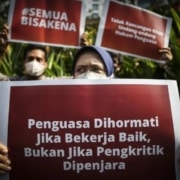
Photo from Canva.
Foreign policy is a topic that rarely dominates election campaigns – Indonesia is no exception. Nonetheless, the implications for the international community are very important.
Indonesia has long been known for what it calls its ‘free and active’ (bebas aktif) foreign policy. It says it maintains ‘freedom’ through a policy of nonalignment with any great power, yet takes an ‘active’ role in humanitarian crises or conflicts as part of its mission to “promote a peaceful and just global order”.
This policy has its origins in the preamble of the 1945 Indonesian Constitution which calls on Indonesia to participate in the execution of a world order of freedom, peace and social justice. However, the interpretation of bebas aktif varies from one presidency to the next. Consider the last two presidencies of Susilo Bambang “SBY” Yudhoyono and Joko “Jokowi” Widodo. SBY used the bebas aktif policy to promote democracy, though initiatives like the Bali Democracy Forum (BDF). In contrast, Jokowi has pursued a domestic-focused foreign policy emphasising investment and trade inflows, rather than projecting norms.
Indonesia’s free and active policy has endured – but that doesn’t mean we should assume continuity in Indonesian foreign policy when there is a change of president.
Indonesia’s voice matters
The world faces an ever-growing list of global crises, from conflicts in Ukraine and Palestine, to transnational challenges like climate change. As the third largest democracy in the world and the largest country in Southeast Asia, Indonesia is increasingly called on for leadership. For this reason, there is strong international interest in the foreign policy platform of Indonesia’s presidential candidates.
All three candidates – Anies Baswedan, Ganjar Pranowo, and Prabowo Subianto – have released their campaign manifestos, which include detailed statements of their foreign policy agenda and priorities. Earlier this month, all three delivered speeches detailing their respective foreign policies in a forum hosted by Centre for Strategic and International Studies (CSIS) – Indonesia’s leading foreign policy think tank.
The differences between them are significant.
Ganjar is focused at home
Ganjar’s foreign policy proposal has many similarities to his predecessor Jokowi. Most notably it is internally focused on five areas – Indonesia as a centre for global rice production; energy security, including electricity exports; securing Indonesia’s maritime borders; industrial “downstreaming” (hilirisasi) policy; and the protection of Indonesian citizens overseas. In fact, most of Ganjar’s proposals were originally initiated by the Jokowi administration.
However, Ganjar shows a lack of understanding on the role of multilateral institutions. His foreign policy manifesto does not mention the United Nations (UN), despite Indonesia’s contributions as a non-permanent member of the UN Security Council and UN Peacekeeping Missons over the past six and a half decades.
Ganjar’s manifesto also did not mention Indonesia’s future role in the Association of Southeast Asian Nations (ASEAN), despite Indonesia’s enormous contributions to ASEAN governance and the fact some commentators consider the country ASEAN’s ‘natural-born’ leader.
Given his lack of foreign policy knowledge, analysts predict Ganjar will delegate many foreign policy issues to the Ministry of Foreign Affairs.
Anies calls for “values-based” foreign policy
On the other hand, Anies has criticised what he calls the ‘transactional’ foreign policy practiced by Jokowi and Ganjar.
He argues Indonesia should instead follow a “values-based” foreign policy, requiring Indonesian diplomats and citizens to see themselves as both Indonesian and global citizens. For Anies, ‘global citizenship’ means Indonesia should not be absent from major diplomatic events and that it should be a point of reference for other nations.
Anies’ manifesto mentions ASEAN and Asia-Pacific Economic Cooperation (APEC) among several regional institutions he will deepen engagement with under his administration.
As an example of his “values-based” foreign policy, Anies argues Indonesia should have taken a stronger position against Russia’s invasion of Ukraine, an indirect criticism of Jokowi’s failure to condemn Russia’s invasion.
Anies also says efforts to restore Indonesia’s international standing will require a strong democracy at home at a time when Indonesia’s democracy indicators – including human rights, media freedom and corruption perception – have declined during the course of Jokowi’s presidency.
Prabowo is full of contradictions
Finally, Prabowo’s foreign policy speech on 13 November was full of contradictions, projecting himself as continuing Jokowi’s policies, while hinting at more populist policy ideas.
He began his speech by repeating standard bebas aktif talking points – that Indonesia respects great powers equally and would not take sides or join any great power security bloc.
However, Prabowo also indicated he is open to Indonesia joining BRICS – the association of rising global and regional middle powers that also counts China and Russia as members. Earlier this year Indonesia declined an invitation to join the organisation due to concerns Indonesia might be seen as sympathising with China and Russia’s efforts to challenge US leadership of the current international order.
Prabowo’s long-standing populism was also on display throughout his speech. He responded to a question about Jokowi’s nickel export ban and other protectionist policies by emphasising the responsibility of foreign investors to create jobs, at one point referencing a slogan of Soekarno, stating “We don’t want to be a nation of coolies.”
Then, responding to a question from a European ambassador about the future of Indonesia’s relationship with the European Union, Prabowo criticised the EU’s policy banning the sale of Indonesian palm oil in Europe, saying it is unfair of Europeans to accuse Indonesia of overexploiting its rainforest given they spent centuries exploiting Indonesia as a Dutch colony.
Prabowo’s combative language contradicted his earlier quotation of SBY’s well-known edict that Indonesia has “one thousand friends too few, one enemy too many.”
The status quo looks likely
So, what we can conclude from comparing the foreign policy priorities of the presidential candidates?
First, Ganjar seems the most committed to continuing Jokowi’s foreign policy agenda.
By contrast, Prabowo pays lip service to continuing the president’s agenda, but also shows a stronger inclination to depart from it – seen for instance in his openness to joining BRICS. His strongman persona reveals a willingness openly confront other nations for disagreeing with Indonesia’s protectionist (or some might say, transactional) foreign policy agenda.
On the other hand, Anies is the most willing to substantially depart from Jokowi’s foreign policy, arguing diplomacy needs to be both values-based and involve cost-benefit calculations. He also recognises Indonesia’s global standing could be enhanced if Indonesia were to recommit itself to universal values that have been eroded under Jokowi’s tenure – like democracy and human rights.
However, most surveys still place Anies far behind Prabowo and Ganjar suggesting his values-based foreign policy may never see the light of day.


 Photo from Canva
Photo from Canva






 https://flickr.com/photos/asiandevelopmentbank/14454539704/
https://flickr.com/photos/asiandevelopmentbank/14454539704/